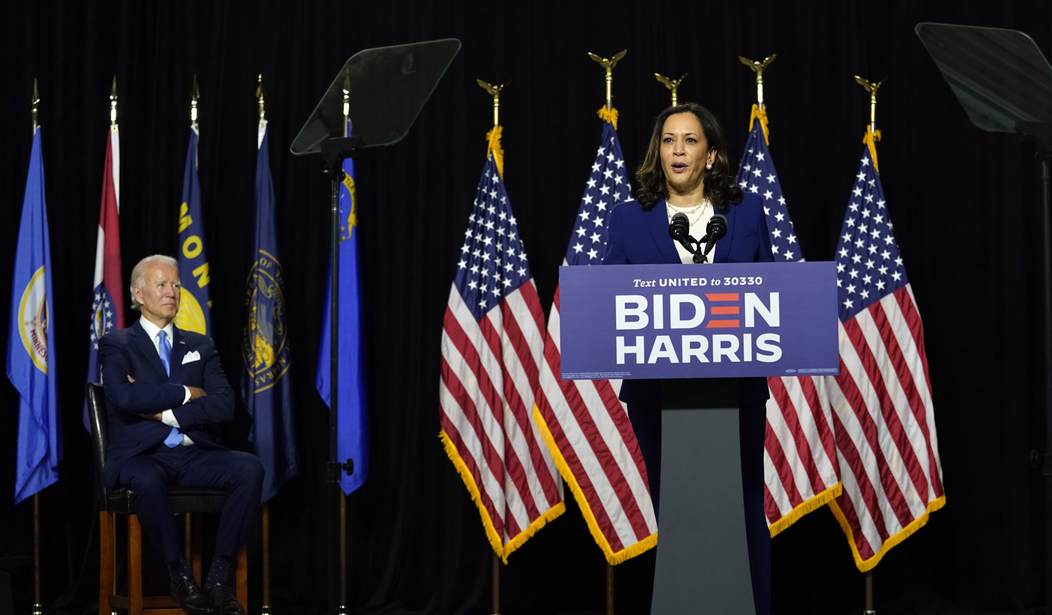It’s official: Sen. Kamala Harris (D-Calif.) is Democratic presidential candidate Joe Biden’s running mate. Since announcing his pick, the former vice president has received some serious criticism for picking a candidate who vehemently criticized him throughout the primary season. But this is to be expected in the American political system. The real issue is how Biden and Harris’ policy ideas will mesh with one another on the campaign trail and what their ideas will mean for taxpayers and consumers.
Unfortunately, Biden’s VP choice is likely to pull him in the direction of higher taxes and a more restricted, less vibrant marketplace. This is especially the case in healthcare, where patients are already struggling with sky-high bills. Biden and Harris should work together to craft an agenda that would lower costs for taxpayers and patients instead of a slow strangulation of the system via taxation and regulation. With a very real potential of Harris becoming president (perhaps even before 2024), Harris’ plans deserve more scrutiny than those of former vice presidents who typically have had very little influence on policy.
People looking to learn more about Sen. Harris’ policy priorities may try to peruse her old campaign site, only to find that – surprise – the site redirects to Biden’s page. Fortunately, taxpayers and consumers can take a ride on the Wayback Machine to relive the glory days of Sen. Harris’ campaign. Before dropping out of the race and endorsing Biden, Harris supported a Medicare for All plan that made Biden’s healthcare vision look like a libertarian pipedream. The prospective vice president envisions a 10-year transition plan away from the current healthcare system, at the end of which, “every American will be a part of this new Medicare system. They will get insurance either through the new public Medicare plan or a Medicare plan offered by a private insurer within that system.” This private component is supposed to be modeled after Medicare Advantage, which consists of plans subscribed to by seniors and sponsored (at least partially) by private insurance companies.
Recommended
The Medicare Advantage program does offer some improvements relative to traditional Medicare plans, since private companies can compete with one another albeit in a strictly regulated framework. But, make no mistake, these “private” Medicare plans are still funded by taxpayers and private sponsors are strictly curtailed in what they can offer patients. In other words, Harris wants taxpayers to pay for everyone’s healthcare benefits and empower bureaucrats to dictate which services should and shouldn’t be covered. Compare this to Biden’s “Obamacare on steroids” approach, which would significantly increase subsidies for state healthcare exchanges and set up a “public option” to fill in present-day gaps in health coverage.
Slated to cost an estimated $750 billion in extra spending over the next 10 years, Biden’s healthcare plan would be astoundingly expensive. But at the very least, the presidential candidate leaves open the possibility that Americans could choose a wholly private plan (if they can afford it after all the extra taxes). Harris’ Medicare for All lunacy makes that an impossibility after just 10 years’ time, forcing hundreds of millions of Americans who like their current plans to sign up for government funded-and-dictated options.
Once this transition is fully implemented, Harris’ plan would likely cost taxpayers at least $2 trillion per year (assuming comparable costs to Sen. Bernie Sanders’ plan). That amounts to $15,000 in added annual costs for each American household. If Biden inches closer to Harris’ ideas by embracing government-run healthcare, he’ll face the inevitable question of how to pay for this new entitlement – on top of all his other proposals. It’s easy to take a page out of former President Barack Obama’s playbook, and promise to not raise taxes on the middle class. But as Obama learned, that’s easier said than done.
The better and more practical approach is to reject expensive new government programs and work to reduce government spending. The deficit this year is slated to surpass $4 trillion, and there’s no realistic plan out there to get costs under control for taxpayers.
Biden and Harris ought to examine ways to introduce some much-needed competition into the healthcare marketplace, which has a proven ability to increase quality and lower costs for patients. This strategy will prove far more helpful to struggling Americans than runaway spending and bureaucracy.
Ross Marchand is the Vice President of Policy for the Taxpayers Protection Alliance.























Join the conversation as a VIP Member